Opinions are divided on Napoleon:Was he a genius warlord and guardian of the legacy of the French Revolution or a war criminal and slave of the people? The story of the French ruler traces the fantastic path of a notorious islander to the most powerful man in Europe.
From Corsica to Power
Napoleon Bonaparte, actually Napoleone Buonaparte, was born on August 15, 1769 in Ajaccio, the capital of the island of Corsica. His family is originally from Italy and his parents belong to the lower nobility. They are raising their eight children in financial hardship.
At the age of nine, Napoleon was able to attend the Brienne military school thanks to a royal scholarship for impoverished nobles. He's the only Corsican there and because of his island accent he's ostracized by his classmates at an early age. But he quickly learns to gain respect through military skill.
Napoleon owes his steep career in the army to the French Revolution of 1789:When he successfully led the artillery of the revolutionary troops in the Battle of Toulon against the royalists loyal to the king in 1793, he was promoted to brigadier general.
Then the breakthrough:In 1796 Napoleon led the Italian campaign. The victory against Austria and the occupation of Belgium, Lombardy and the banks of the Rhine pave the way to power.
At the same time, he managed to rise in French society:in 1796 he married the higher-ranking Joséphine de Beauharnais.
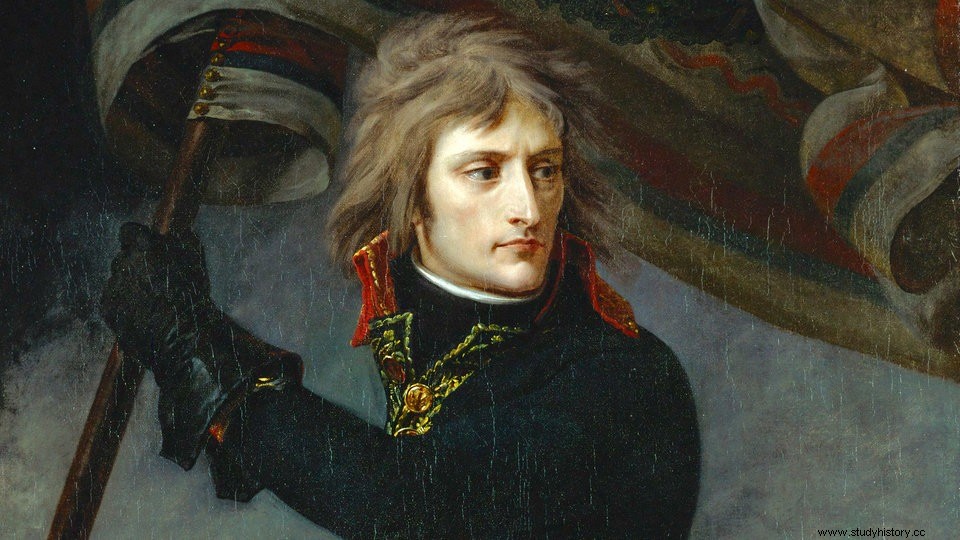
Napoleon as a young general in 1796
In 1798 he set off on the "Egyptian Expedition" on the orders of the revolutionary government. This campaign on the Nile becomes a triumph:Napoleon not only achieves Egypt's independence from the Ottoman Empire, he also causes a cultural boom with the campaign - interest in the Egypt of the pharaohs is revived.
Homemade coronation
Napoleon's great popularity in the army and among the people helped him to overthrow the revolutionary government in 1799. On December 13, he was elected chief of three consuls for a ten-year term. In practice, he now has sole power.
He centralized the young post-revolutionary state structure in France and initiated reforms in the judiciary, the military and education. In 1804 he published the "Code civil", the first civil code in France. Napoleon poured the central ideas of freedom from the revolution into a legal form that is still valid today. His campaigns bring money into the state coffers, he can restructure the French budget.
After he had himself appointed consul for life in 1802, he was crowned Emperor of France in 1804. Napoleon dares the scandal:In the Notre Dame Cathedral in Paris he snatches the crown from the Pope and without further ado crowns himself.
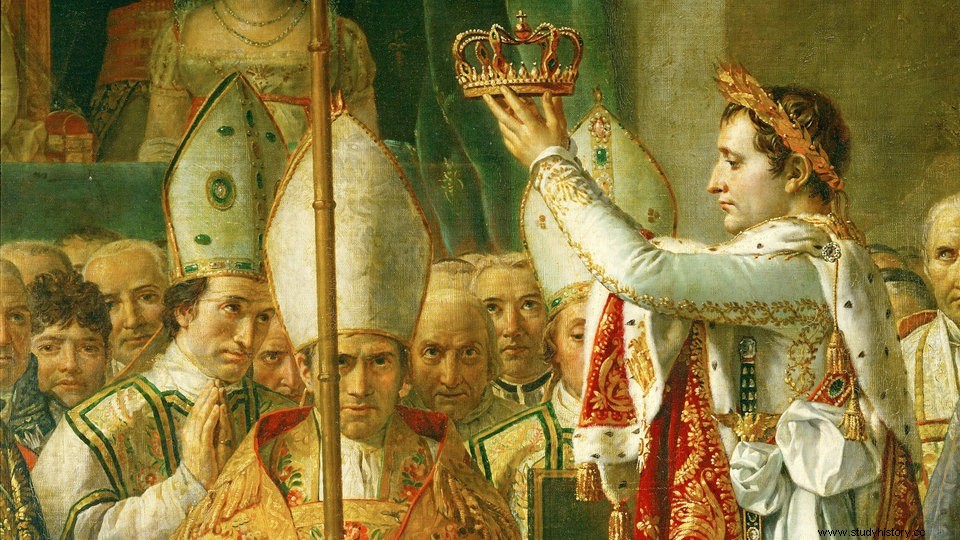
Napoleon crowned himself Emperor in Paris in 1804
Driven by the desire to be the ruler of Europe like Charlemagne, he continued his aggressive expansion policy as Emperor Napoleon I. He conquers Italy and Holland and installs his brothers as kings of the vassal states.
In the conquered areas, especially on German soil, he orders drastic territorial and legal reforms. Napoleon celebrated his greatest military success in 1805 at the so-called "Battle of the Three Emperors" in Austerlitz. There he beats Austria and Russia. The Peace Treaty of Pressburg dealt the deathblow to the long-established Holy Roman Empire of the German Nation.
General of a new type
As a general, Napoleon impresses with the speed of his decisions and the military reconnaissance of the enemy. His scouts get information about the enemy's plans from all possible sources. On the eve of the Battle of Austerlitz he changed his strategy completely - with success. Since Austerlitz, his army has enjoyed a legendary reputation.
With rapid wars of aggression, Napoleon brought up a new philosophy of war. Its wars are total, they call into question the existence of entire states and mobilize entire peoples. Napoleon's contemporary Carl von Clausewitz wrote in 1812:
"Now the means that could be expended, the efforts that could be summoned, no longer had any definite limit; the energy with which the war itself could be waged no longer had any counterpoise, and consequently the danger to the enemy was the utmost. "
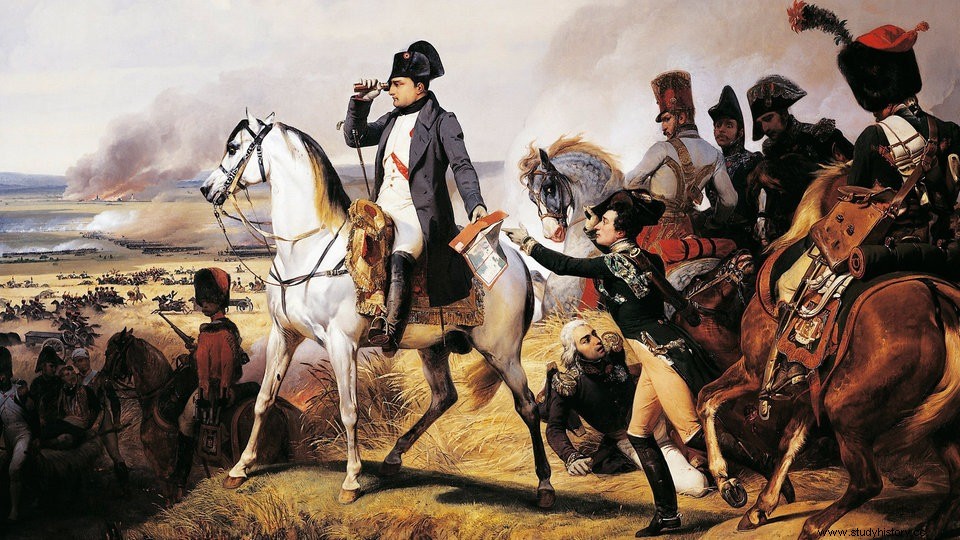
Napoleon always leads his troops himself
With the so-called continental blockade, Napoleon even created a new form of war:economic warfare. In order to bring Great Britain to its knees, he imposed a radical import ban on all goods from the British Isles and its colonies in 1806.
From Tilsit to St. Helena
In 1807 Napoleon was at the height of his power. In Jena and Auerstedt he defeats the Prussians. In the Peace of Tilsit he ties an alliance with Russia's Tsar Alexander I. His sphere of influence now extends from the southern tip of Spain to the easternmost end of Poland.
He wanted an heir to the throne and therefore divorced his childless marriage to Joséphine in 1809. He takes Marie Louise, daughter of the Austrian Emperor, as his new wife. With her he sires his only legitimate son, Napoleon II.
France's emperor is pushing for more power. In 1812 Napoleon broke with the Russian tsar and marched towards Moscow.
The Russian campaign, for which he mobilized armies from almost every part of his sphere of influence, became Napoleon's disaster. Tens of thousands of soldiers die, Napoleon is now on the defensive. Russia successfully allies with Prussia and Austria. Napoleon finally loses the so-called "Battle of Nations" near Leipzig in 1813.
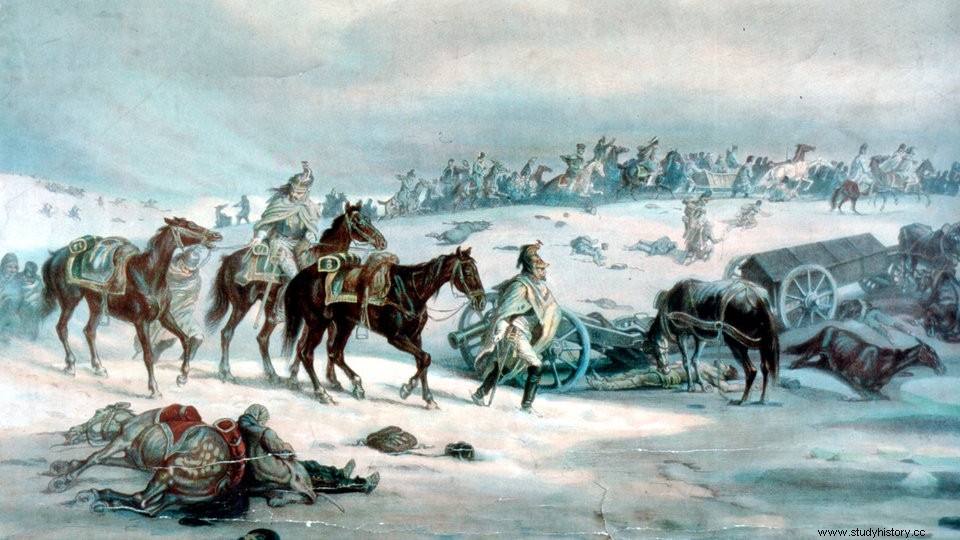
The Russian campaign turns into a disaster for the French army
On March 31, 1814, the anti-Napoleonic coalition conquered Paris. Emperor Napoleon I has to abdicate and is exiled to the Mediterranean island of Elba. But on March 1, 1815, Napoleon managed to escape to France. He can quickly gather troops around him and regain power. He rules for a hundred days, but is then crushed on June 18th at the Battle of Waterloo, Belgium.
The British banish him to the English island of St. Helena in the middle of the South Atlantic. Napoleon died there on May 5, 1821, probably from stomach cancer. In 1840, the French had his bones laid out in a magnificent coffin under the dome of Les Invalides in Paris.
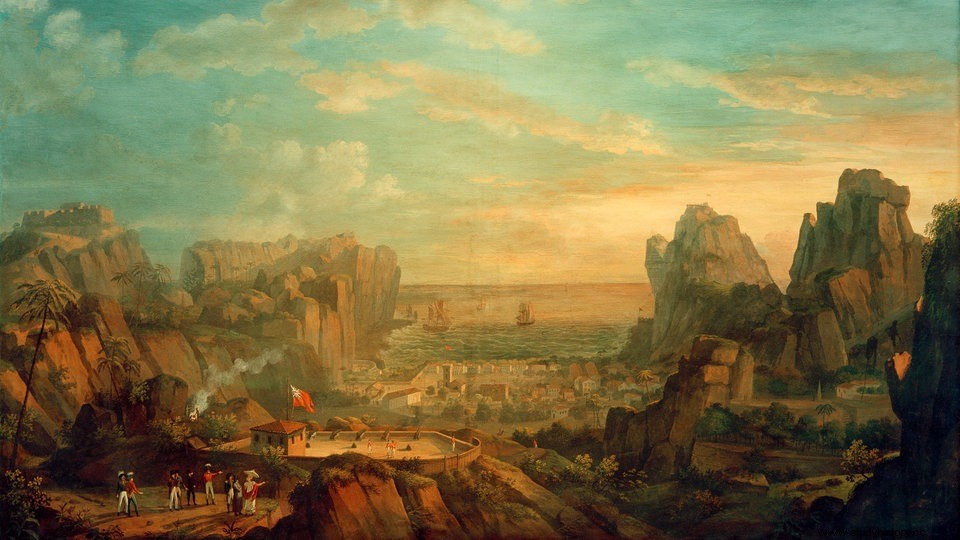
Napoleon spends his last years in exile on St. Helena
Napoleon myth
Immediately after his death, the controversy about Napoleon's importance for posterity begins. The influential French foreign policy expert Talleyrand laconically assessed the news of his former emperor's death:"It's just news, it's no longer an event."
The romantic writer and diplomat Chateaubriand, on the other hand, remarks that now "the mightiest breath of life that ever animated human clay" has ceased to breathe.
According to the death certificate, Napoleon is said to have measured 1.66 meters. "Napoleon complex" is the name of the behavior when people want to compensate for their small size with success and status symbols. The tale that Napoleon was of short stature holds true. At the then average height of 1.61 meters, he was even a bit taller than his contemporaries.
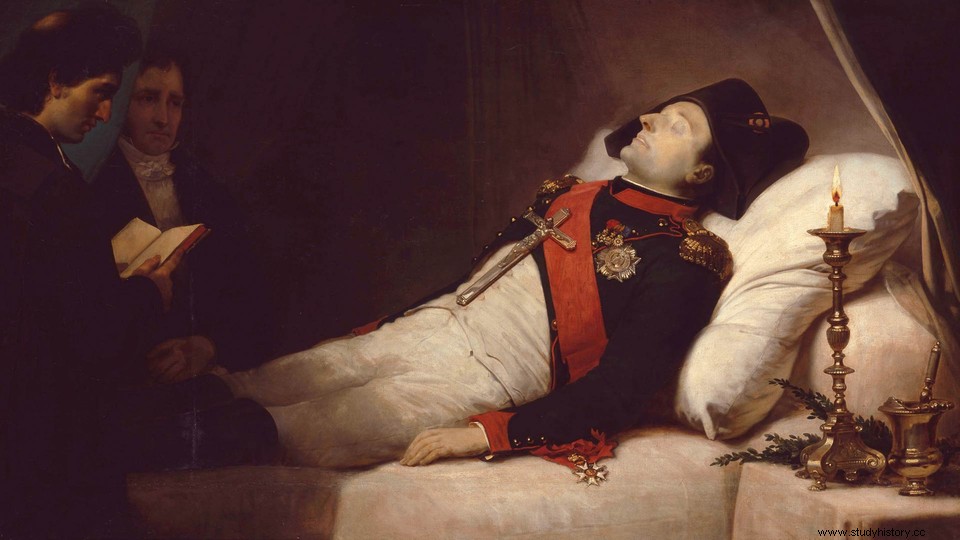
Mythmaking begins on the deathbed
Napoleon's brutal will to power is undisputed. He is said to have fought more battles than Charlemagne, Hannibal and Caesar combined. He left behind mountains of corpses with his military campaigns - and yet:he not only fascinates his contemporaries.
Heinrich Heine wrote:"Napoleon is not made of the wood from which kings are carved - he is from the marble from which gods are made."
And later the poet Christian Morgenstern (1871-1914) remarked:"Napoleon was a natural phenomenon. To slander him as a great butcher means nothing more than calling an earthquake gross mischief or a thunderstorm disturbing the public peace."
